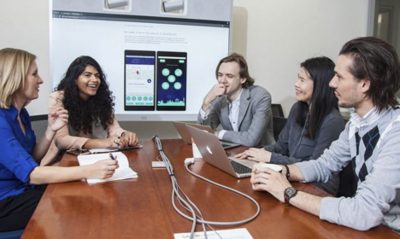
A team of Boston University students and graduates has created an app called Urban Refuge that helps urban refugees in Amman, Jordan locate resources and non-governmental organizations near them.
Noora Lori, a professor of international relations who helped create the app, said in a presentation at the BUild Lab on Tuesday that though two-thirds of the world’s refugees are in urban areas, they have more trouble accessing resources than those living in camps.
“We see a huge drop in access to aid when you move from the camp structure to the urban infrastructure,” Lori said. “That’s kind of puzzling, because you have a higher infrastructure and more service providers in urban settings. But people can’t necessarily access those resources.”
Urban Refuge Co-Director of Market and Community Culture Ellie Hitt, a 2017 graduate of the Frederick S. Pardee School of Global Studies, said Urban Refuge helps refugees by providing an uncluttered map that shows different categories of resources and NGOs in their area.
“[Urban refugees] will be able, in advance, to go and seek out the kind of resources that they’re interested in,” Hitt said, “rather than being bombarded with a lot of unfiltered raw data.”
The team decided to focus on Jordan because up to 80 percent of its 650,000 registered Syrian refugees reside in urban areas, said Director of Strategy and Public Engagement and Pardee senior Meaghan Delaney.
Hitt said the app was started in the spring of 2016 as part of an experimental course on forced migration and human trafficking where students were “given the freedom … to really take ownership of [their] own learning.” The app has now reached the development stage.
“What happened from that was actually creating a real-life solution,” Hitt said.
Once the students discovered the asymmetries of refugee aid access in Jordan, Delaney said, they felt they had to find a solution to the problem.
“We realized the data we collected could not just stay inside of the classroom,” Delaney wrote in an email. “We knew we had to share it, and we thought “Why not share this information in a mobile application?’”
Lori said in her BUild Lab presentation that she wanted to show that there are ways to impact policy beyond traditional methods.
“In the lead-up to [the 2016 presidential election] in particular, I just felt angry,” Lori said. “… I didn’t think that the only thing that we could do was sit and wait and watch while two people determine what’s going to happen to the rest of the world.”
Delaney said Boston is a great place to find resources and plan for the future of Urban Refuge.
“Boston is a tremendous resource,” Delaney wrote, “so I get people engaged in our mission and what we are trying to achieve.”
Lori said the students started with no technology or business experience, but after crowdsourcing help from undergraduate student organizations, they were able to pitch the app to Microsoft, which built an initial prototype.
Lori said the team has now built a second prototype using the Software and Application Innovation Lab at BU, and has partnered with an NGO in Istanbul.
Delaney wrote that in the future, the team hopes to implement the app in other cities with high concentrations of urban refugees.
Hitt said that due to the class makeup, the initial Urban Refuge team was all-female, and remains female-driven today. She said it provoked discussion on how women should be involved in the intersection of humanitarian aid and technology.
“It’s been really exciting and interesting to do this as a group of women who are not traditionally in tech, but who have tried to learn the ropes and [have] done as much as we can,” Hitt said.
Delaney, a member of the all-female leadership board, wrote that though it was unintentional, the team’s unconventional gender makeup has made the experience a great one.
“We have an amazing group of intelligent, accomplished, and determined women,” Delaney wrote. “It is an inspiring group of people to work with.”























































































































